Born and raised on a pedigree Limousin bull stud in Australian cattle country, Claire Power never “considered a career away from agriculture”.
“It’s bred into me,” she reflects. “I could never see myself doing a nine to five.”
What she might not have predicted, however, was that she would end up farming on the other side of the world in Co Carlow; and launching her own country lifestyle fashion brand, Ballybar, designed “for farmers by farmers”.
Though we are sure there are some readers already wondering why you would swap the sunshine and wide open spaces of Australia for Ireland; surely that’s the dream?
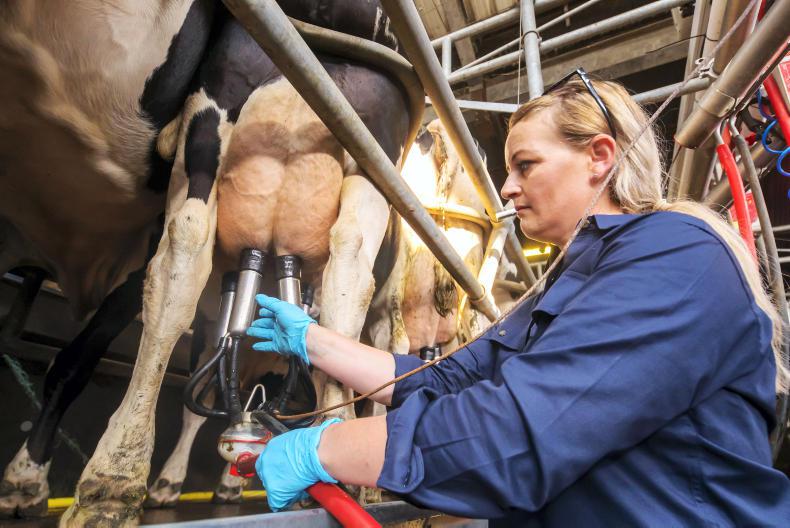
Claire Power milking on her farm in Tinryland, Co Carlow. \ Patrick Browne
“Maybe it is if you live in ‘Summer Bay,’” laughs Claire, who explains that while her family sold around 200 Limousin bulls a year, as well as running a contracting business and growing cereals on their farm close to Wagga Wagga in New South Wales, conditions were constantly challenging.
“When my husband came over to work on our farm, we were going through a 10-year drought that actually messes with your mind because literally the whole country has run out of feed,” she says.
“Grain prices and feed prices are through the roof, cow prices have fallen through the floor; and compared to up north, we were quite lucky because a lot of guys would be shooting cattle and that sort of thing because it wouldn’t pay for them to put them on a truck and take them to the sale yard.”
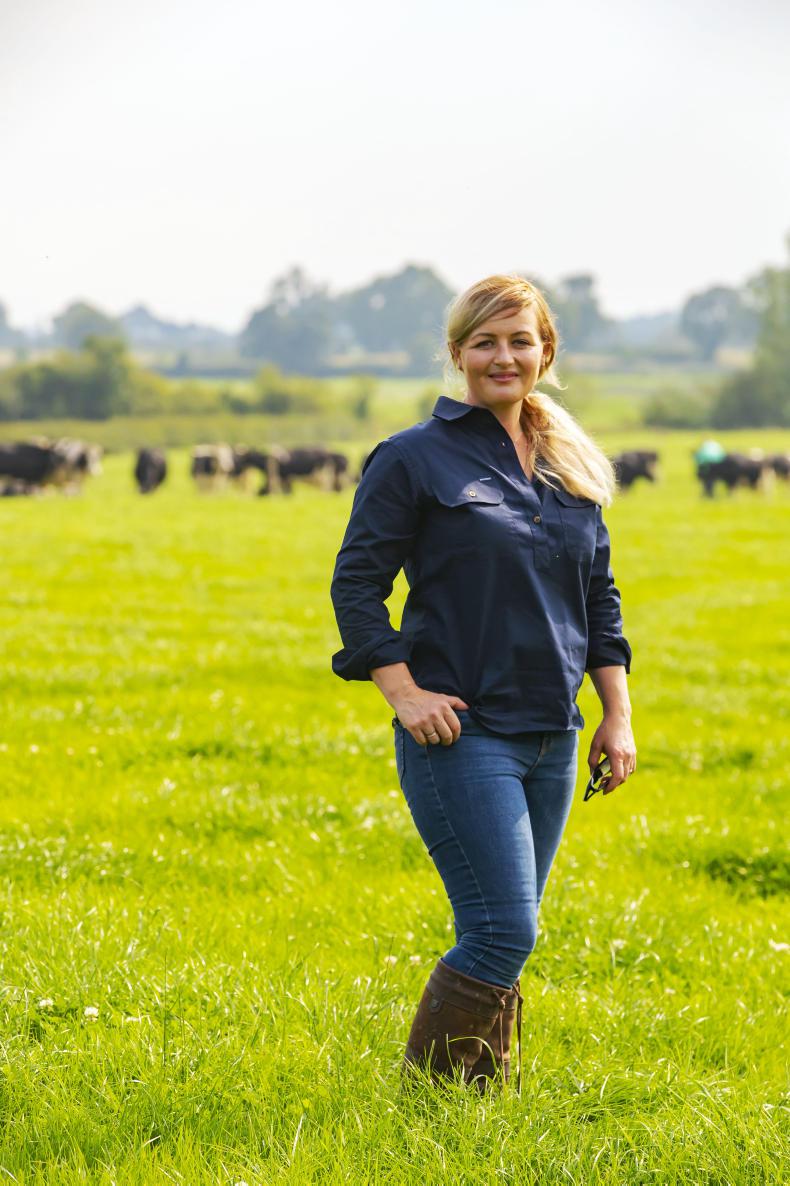
Claire Power launched her Ballybar fashion brand in June. \ Patrick Browne
Claire’s husband is Damien Power from Tinryland, Co Carlow, who like many Irish people travelling in Australia in the early noughties, had to do a short stint working on a farm to extend his visa. We joke that at least romance could blossom in the drought.
“Everyone tells me that and I’m like, ‘Oh God, it doesn’t feel very romantic anymore!” jokes Claire, who explains that while Damien later returned to his family farm, they kept in touch and she followed over about five years later in 2011.
Converting to dairy
While Claire worked in a chemist shop when she first moved to Ireland, from the start, she was very involved on the farm.
At that time, Damien, and his parents, David and Teresa, were in beef and tillage, but Claire explains that by 2017, they realised that the farm “just couldn’t support the two families” and made the decision to convert to dairy.
“So we went and bought 80 heifers in 2017 to calve in February 2018,” says Claire, who explains that the biggest change from her point of view was grass management; though the weather did not help the transition, especially as she thought she had left the days of drought behind her.
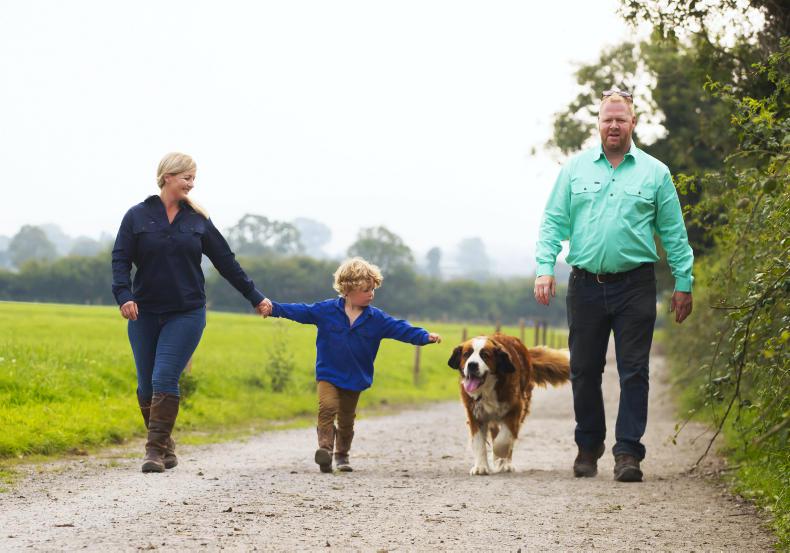
Claire Power with her husband Damien, son Hugh and their dog Tigger. \ Patrick Browne
“When we had the bad drought here in 2018, it kind of brought all these horrible feelings back again,” she says. “It’s still fairly raw, even though it’s 10 years ago.”
She has no regrets, however, and today, the couple are milking 100 cows and supplying Glanbia in what is very much a “team effort”.
“He doesn’t touch the calves though! He’s not allowed to,” laughs Claire.
Starting a brand
Along with entering dairying, Claire and Damien also started their family, with son Hugh arriving in 2015.
Life was busy, both on and off farm, but one thing that Claire struggled with was getting “proper workwear” that was both functional; and a little bit fashionable.
“You just always ended up wearing your husband’s jumper or t-shirt, it was all poly cotton, it wasn’t breathable and ripped or shrunk as soon as you washed it,” she explains.
“I just thought, ‘Surely I can’t be the only female over here that’s having the same issue?’”
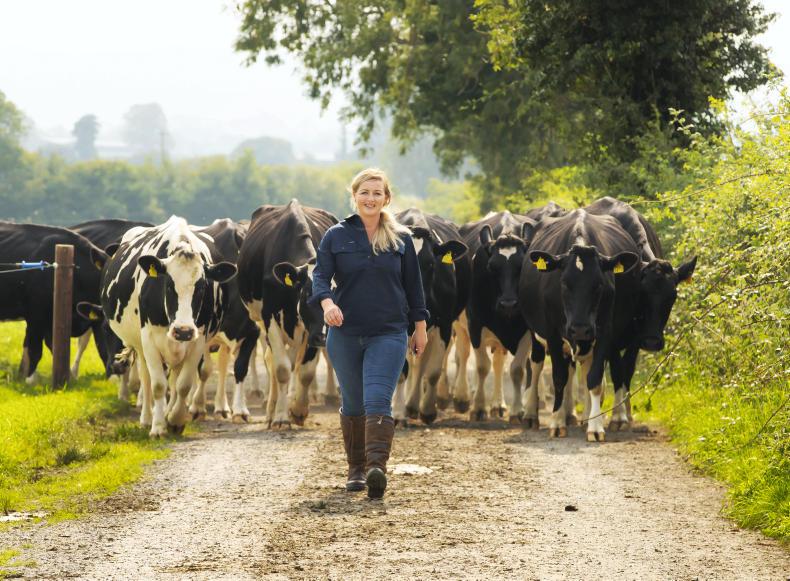
Claire Power juggles running Ballybar with the family dairy farm in Tinryland, Carlow. \ Patrick Browne
Claire made a wishlist of what she would like in a work shirt: that it would be made from 100% breathable cotton, offer 50 + sun protection, be double stitched for durability, and have a number of practical design features, from two back shoulder darts for ease of movement to double pockets with button-down flaps and pen slot.
She then set to work online sourcing fabrics, choosing colours and finding a manufacturer who could produce what she wanted (while she initially looked for an Irish manufacturer, she found it very difficult to source what she wanted and so ended up working with a company overseas, as they could offer features like the double stitching).
And after much “to-ing and fro-ing” until she was entirely happy, Claire launched Ballybar – named after a racecourse that used to run near the Carlow farm – this June.
Claire also offers an embroidery service for anybody who wants to customise their shirts
The initial collection includes the women’s “filly” work shirt in sizes 8-22 in either sky blue, blush pink or navy and the men’s “colt” work shirt in sizes small to XX-large in cobalt or emerald, retailing at €45. Claire also offers an embroidery service for anybody who wants to customise their shirts.
“(Such as) silage contractors or if you’ve got a pedigree sheep herd; your whole team can be wearing the shirt with the same logo on it,” she says.
Using Instagram
As well as the shirts, Claire is also a reseller for a variety of country living-style accessories, such as fedoras, feather hat pins, and belts and purses. The business is self-funded to date and very much a “kitchen table” enterprise.
“I milk in the mornings, then come in, pack orders, do a little bit on the computer, but I do most of the work on the shirts after my son goes to bed at night,” says Claire, who explains that sales are currently split 50:50 between Ireland and the UK.
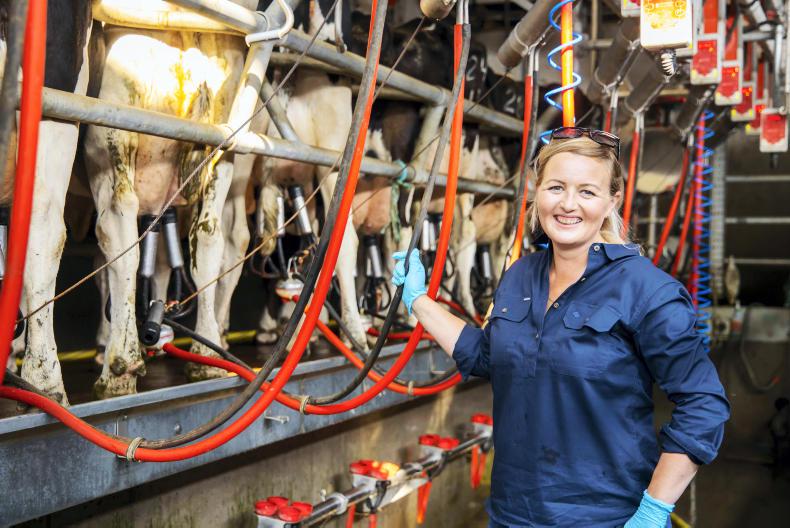
Claire Power in one of her Ballybar shirts while working on her farm in Tinryland, Carlow. \ Patrick Browne
Her initial plan was to promote her brand by attending major events like the Dublin Horse Show and the National Ploughing Championships. COVID-19, however, put paid to that, so all of her marketing has been done online, with Instagram proving the main channel for getting the word out.
“But it’s not paid, it’s all just organic, and I had an unbelievable response from Instagram,” says Claire, whose only previous experience of marketing was organising pedigree sales on the farm in Australia.
“I just applied it to shirts instead of bulls!” she laughs.
She believes, however, that customers have connected with the brand because of her back story.
They’re not just taking pretty photos of cows, they’re actually in there working, day in and day out
“If you’ve got a genuine story and it resonates with your target market, I think that’s the most important thing,” says Claire, who has also collaborated with many other Irish female farmers on Instagram to share their stories and build a “Ballybar Collective”, which in turn has helped promote the brand.
“They’ve been an integral part of the whole campaign for me,” she says. “They’re not just taking pretty photos of cows, they’re actually in there working, day in and day out.”
Which sounds pretty much like Claire Power herself...
For further information, visit
www.ballybarireland.com
Read more
Lessons to learn on TB eradication from Australia and NZ
Opportunity to brand Irish beef
Born and raised on a pedigree Limousin bull stud in Australian cattle country, Claire Power never “considered a career away from agriculture”.
“It’s bred into me,” she reflects. “I could never see myself doing a nine to five.”
What she might not have predicted, however, was that she would end up farming on the other side of the world in Co Carlow; and launching her own country lifestyle fashion brand, Ballybar, designed “for farmers by farmers”.
Though we are sure there are some readers already wondering why you would swap the sunshine and wide open spaces of Australia for Ireland; surely that’s the dream?

Claire Power milking on her farm in Tinryland, Co Carlow. \ Patrick Browne
“Maybe it is if you live in ‘Summer Bay,’” laughs Claire, who explains that while her family sold around 200 Limousin bulls a year, as well as running a contracting business and growing cereals on their farm close to Wagga Wagga in New South Wales, conditions were constantly challenging.
“When my husband came over to work on our farm, we were going through a 10-year drought that actually messes with your mind because literally the whole country has run out of feed,” she says.
“Grain prices and feed prices are through the roof, cow prices have fallen through the floor; and compared to up north, we were quite lucky because a lot of guys would be shooting cattle and that sort of thing because it wouldn’t pay for them to put them on a truck and take them to the sale yard.”

Claire Power launched her Ballybar fashion brand in June. \ Patrick Browne
Claire’s husband is Damien Power from Tinryland, Co Carlow, who like many Irish people travelling in Australia in the early noughties, had to do a short stint working on a farm to extend his visa. We joke that at least romance could blossom in the drought.
“Everyone tells me that and I’m like, ‘Oh God, it doesn’t feel very romantic anymore!” jokes Claire, who explains that while Damien later returned to his family farm, they kept in touch and she followed over about five years later in 2011.
Converting to dairy
While Claire worked in a chemist shop when she first moved to Ireland, from the start, she was very involved on the farm.
At that time, Damien, and his parents, David and Teresa, were in beef and tillage, but Claire explains that by 2017, they realised that the farm “just couldn’t support the two families” and made the decision to convert to dairy.
“So we went and bought 80 heifers in 2017 to calve in February 2018,” says Claire, who explains that the biggest change from her point of view was grass management; though the weather did not help the transition, especially as she thought she had left the days of drought behind her.

Claire Power with her husband Damien, son Hugh and their dog Tigger. \ Patrick Browne
“When we had the bad drought here in 2018, it kind of brought all these horrible feelings back again,” she says. “It’s still fairly raw, even though it’s 10 years ago.”
She has no regrets, however, and today, the couple are milking 100 cows and supplying Glanbia in what is very much a “team effort”.
“He doesn’t touch the calves though! He’s not allowed to,” laughs Claire.
Starting a brand
Along with entering dairying, Claire and Damien also started their family, with son Hugh arriving in 2015.
Life was busy, both on and off farm, but one thing that Claire struggled with was getting “proper workwear” that was both functional; and a little bit fashionable.
“You just always ended up wearing your husband’s jumper or t-shirt, it was all poly cotton, it wasn’t breathable and ripped or shrunk as soon as you washed it,” she explains.
“I just thought, ‘Surely I can’t be the only female over here that’s having the same issue?’”

Claire Power juggles running Ballybar with the family dairy farm in Tinryland, Carlow. \ Patrick Browne
Claire made a wishlist of what she would like in a work shirt: that it would be made from 100% breathable cotton, offer 50 + sun protection, be double stitched for durability, and have a number of practical design features, from two back shoulder darts for ease of movement to double pockets with button-down flaps and pen slot.
She then set to work online sourcing fabrics, choosing colours and finding a manufacturer who could produce what she wanted (while she initially looked for an Irish manufacturer, she found it very difficult to source what she wanted and so ended up working with a company overseas, as they could offer features like the double stitching).
And after much “to-ing and fro-ing” until she was entirely happy, Claire launched Ballybar – named after a racecourse that used to run near the Carlow farm – this June.
Claire also offers an embroidery service for anybody who wants to customise their shirts
The initial collection includes the women’s “filly” work shirt in sizes 8-22 in either sky blue, blush pink or navy and the men’s “colt” work shirt in sizes small to XX-large in cobalt or emerald, retailing at €45. Claire also offers an embroidery service for anybody who wants to customise their shirts.
“(Such as) silage contractors or if you’ve got a pedigree sheep herd; your whole team can be wearing the shirt with the same logo on it,” she says.
Using Instagram
As well as the shirts, Claire is also a reseller for a variety of country living-style accessories, such as fedoras, feather hat pins, and belts and purses. The business is self-funded to date and very much a “kitchen table” enterprise.
“I milk in the mornings, then come in, pack orders, do a little bit on the computer, but I do most of the work on the shirts after my son goes to bed at night,” says Claire, who explains that sales are currently split 50:50 between Ireland and the UK.

Claire Power in one of her Ballybar shirts while working on her farm in Tinryland, Carlow. \ Patrick Browne
Her initial plan was to promote her brand by attending major events like the Dublin Horse Show and the National Ploughing Championships. COVID-19, however, put paid to that, so all of her marketing has been done online, with Instagram proving the main channel for getting the word out.
“But it’s not paid, it’s all just organic, and I had an unbelievable response from Instagram,” says Claire, whose only previous experience of marketing was organising pedigree sales on the farm in Australia.
“I just applied it to shirts instead of bulls!” she laughs.
She believes, however, that customers have connected with the brand because of her back story.
They’re not just taking pretty photos of cows, they’re actually in there working, day in and day out
“If you’ve got a genuine story and it resonates with your target market, I think that’s the most important thing,” says Claire, who has also collaborated with many other Irish female farmers on Instagram to share their stories and build a “Ballybar Collective”, which in turn has helped promote the brand.
“They’ve been an integral part of the whole campaign for me,” she says. “They’re not just taking pretty photos of cows, they’re actually in there working, day in and day out.”
Which sounds pretty much like Claire Power herself...
For further information, visit
www.ballybarireland.com
Read more
Lessons to learn on TB eradication from Australia and NZ
Opportunity to brand Irish beef









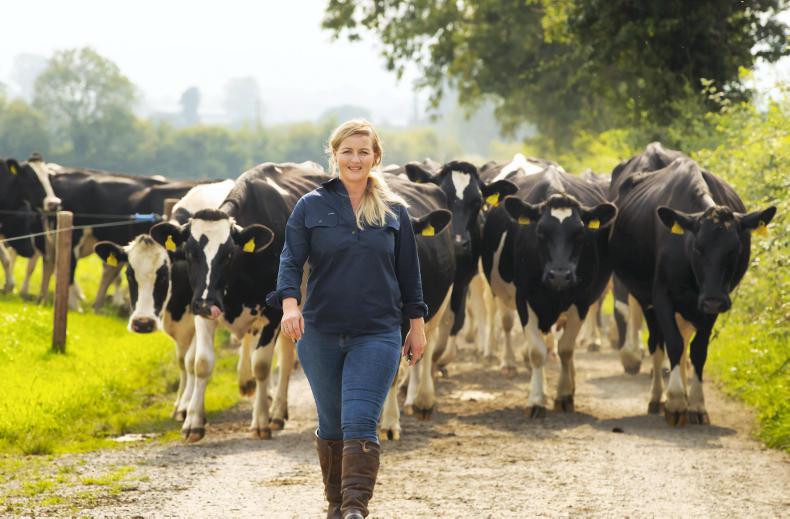


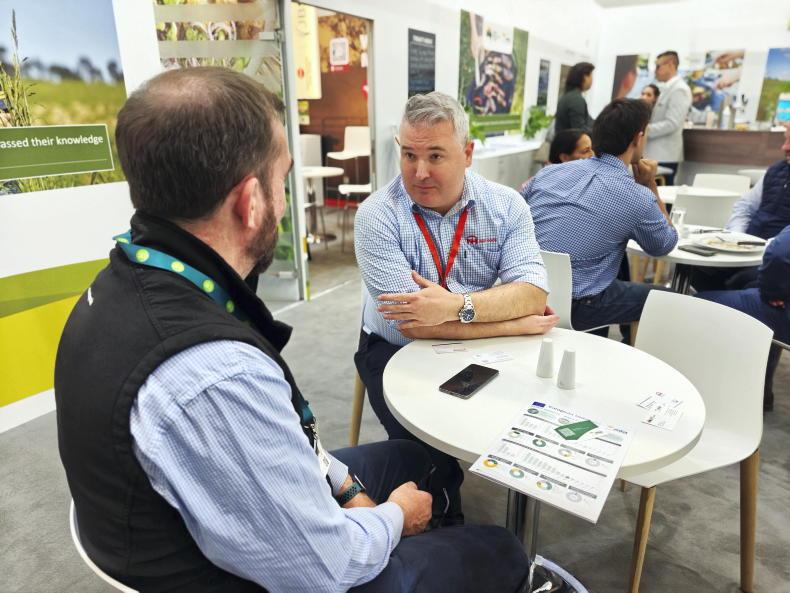
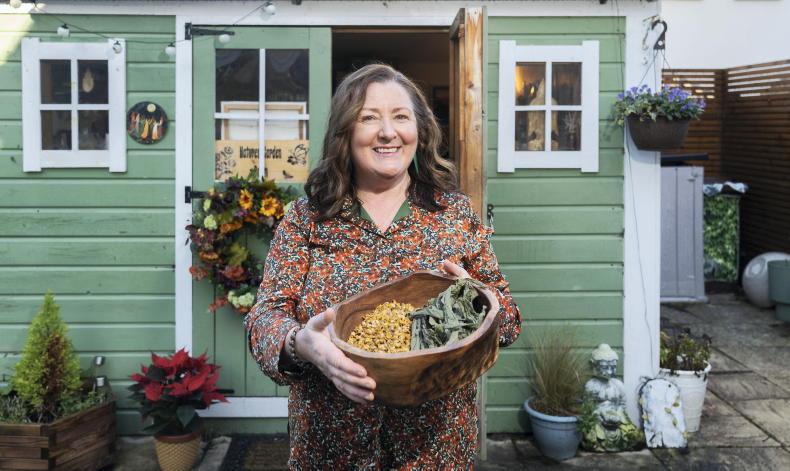
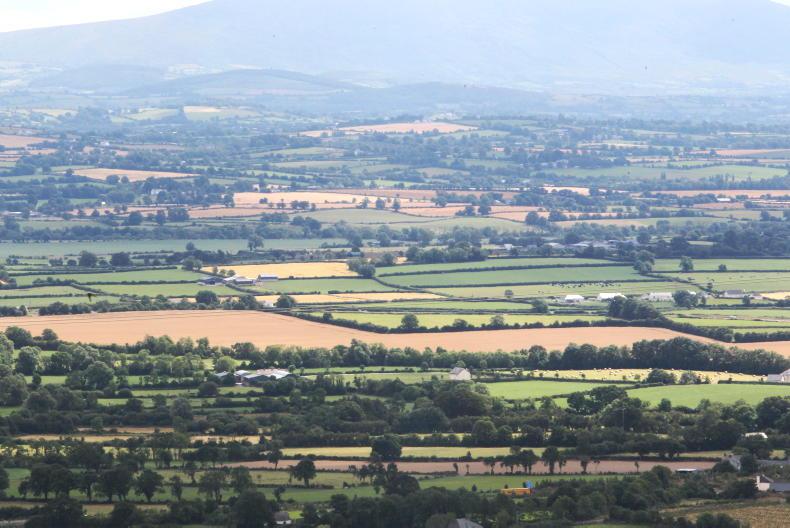
SHARING OPTIONS